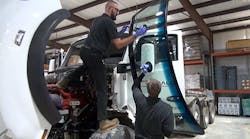If a fleet is unable to perform alignment services in-house, it is important to evaluate local providers when outsourcing to determine their ability to perform a proper total vehicle alignment.
Similar to researching equipment for their own shop, fleets should do the same for a potential outsourced service provider. Consider the following items to ask:
- What brand and model of gauging equipment do they use?
- What features does the gauging equipment have?
- How long have has the shop been using this equipment?
- Does the shop have any service comebacks? In other words, how often have trucks returned due to bad alignment?
“[Fleets] want to look for a shop with a good reputation, knowledgeable technicians, high-quality equipment, and a capability to address issues with all truck axles, not just the front axles,” says Steve Lemnah, heavy duty product manager at Hunter Engineering Company. “Turnaround is also important.”
“Are the technicians conscientious and do they understand what they are reading on the screen and how it relates to the truck?” adds John Knutson, technical support and warranty manager at Hendrickson.
The Technology and Maintenance Council (TMC) Recommended Practice (RP) 642, Total Vehicle Alignment: Recommendations for Maximizing Tire and Alignment-related Component Life, states all alignments are not created equal and to pick a shop that relies upon repeat business, not drive-by sales.
TMC RP 642 also suggests asking the service provider if their alignment technicians are certified, do they offer value-added services such as tire rotation or vehicle pickup and delivery, or whether they have vibration analysis, balancing, truing, suspension, and spring services?
To know whether the alignment was indeed effective, the proof is in the tires. Tire wear performance doesn’t lie.



